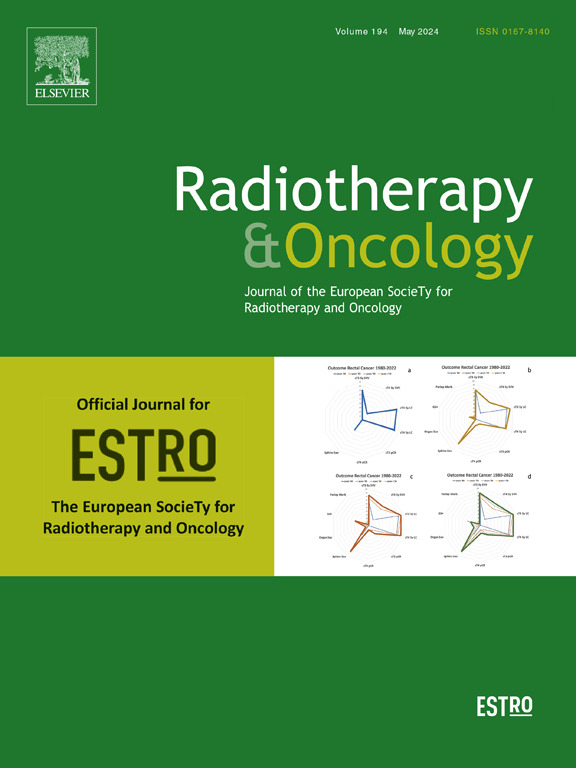Non-cisplatin concurrent agents plus definitive radiotherapy for locally advanced head and neck cancer: A network meta-analysis of randomized studies
IF 4.9
1区 医学
Q1 ONCOLOGY
引用次数: 0
Abstract
Introduction
Head and neck squamous cell carcinoma (HNSCC) poses a significant clinical challenge, particularly in its locally advanced stages. Cisplatin-based, definitive, chemoradiotherapy (CRT) is recognized as the preferred treatment strategy, providing substantial survival benefits and currently achieving the best locoregional control (LRC). However, the toxicity profile of cisplatin, which includes nephrotoxicity, neurotoxicity, and ototoxicity, restricts its application in patients with comorbidities or those of advanced age. Emerging alternatives such as carboplatin, taxanes, cetuximab, and immune checkpoint inhibitors (ICIs) are gaining attention. This study undertakes a network meta-analysis (NMA) to assess the effectiveness and safety of these agents in conjunction with definitive RT.
Methods
The inclusion criteria targeted definitive RT in conjunction with non-cisplatin systemic therapies, compared to RT with or without cisplatin in adult HNSCC patients. The outcomes evaluated included overall survival (OS), progression-free survival (PFS), and locoregional control (LRC). Statistical methodologies, including the Surface Under the Cumulative Ranking Curve (SUCRA), were employed to rank the treatment protocols.
Results
The analysis incorporated 29 randomized controlled trials assessing 18 treatment modalities. Three cisplatin-based regimens combined with RT consistently demonstrated superior efficacy in OS, ranking as the 3 most effective option for OS, followed by weekly docetaxel combined with RT. Non-cisplatin alternatives such as mitomycin C-based regimens + RT, and methotrexate + RT, demonstrated promising efficacy. For PFS, they ranked first and second, with SUCRA scores of 83 % and 79 %, respectively. Regarding LRC, mitomycin C-based regimens + RT and weekly docetaxel + RT emerged as the top two options, achieving SUCRA scores of 97 % and 93 %, respectively. Cetuximab and ICIs combined with RT ranked lowest across all assessed outcomes.
Conclusion
While cisplatin remains the standard of care, carboplatin, mitomycin C-based, and weekly docetaxel + RT regimens present viable alternatives as concurrent agents during RT for patients with stage III-IV HNSCC who are not eligible for cisplatin. It is imperative to develop tailored treatment strategies to enhance clinical outcomes.
非顺铂联合放疗治疗局部晚期头颈癌:随机研究的网络荟萃分析
头颈部鳞状细胞癌(HNSCC)提出了重大的临床挑战,特别是在其局部晚期。以顺铂为基础的确定性放化疗(CRT)被认为是首选的治疗策略,可提供实质性的生存益处,目前实现了最佳的局部区域控制(LRC)。然而,顺铂的毒性,包括肾毒性、神经毒性和耳毒性,限制了其在合并症或高龄患者中的应用。新兴的替代药物如卡铂、紫杉烷、西妥昔单抗和免疫检查点抑制剂(ICIs)正在引起人们的关注。本研究采用网络荟萃分析(NMA)来评估这些药物联合终末期放疗的有效性和安全性。方法:纳入标准针对终末期放疗联合非顺铂全身治疗,与成人HNSCC患者联合顺铂或不联合顺铂的RT进行比较。评估的结果包括总生存期(OS)、无进展生存期(PFS)和局部区域控制(LRC)。采用累积排序曲线下曲面(SUCRA)等统计方法对治疗方案进行排序。结果:分析纳入了29项随机对照试验,评估了18种治疗方式。以顺铂为基础的三种方案联合放疗在OS中均表现出优越的疗效,是OS的3个最有效的选择,其次是每周多西他赛联合放疗。非顺铂替代方案,如丝裂霉素c为基础的方案 + RT和甲氨蝶呤 + RT,显示出良好的疗效。对于PFS,他们排名第一和第二,SUCRA得分分别为83 %和79 %。在LRC方面,基于丝裂霉素c的方案 + RT和每周多西他赛 + RT成为前两种选择,SUCRA评分分别为97 %和93 %。西妥昔单抗和ICIs联合RT在所有评估结果中排名最低。结论:虽然顺铂仍然是标准的治疗方案,卡铂、丝裂霉素c为基础的和每周多西他赛 + 的放疗方案对于不符合顺铂条件的III-IV期HNSCC患者在放疗期间作为并发药物是可行的选择。必须制定量身定制的治疗策略以提高临床效果。
本文章由计算机程序翻译,如有差异,请以英文原文为准。
求助全文
约1分钟内获得全文
求助全文
来源期刊

Radiotherapy and Oncology
医学-核医学
CiteScore
10.30
自引率
10.50%
发文量
2445
审稿时长
45 days
期刊介绍:
Radiotherapy and Oncology publishes papers describing original research as well as review articles. It covers areas of interest relating to radiation oncology. This includes: clinical radiotherapy, combined modality treatment, translational studies, epidemiological outcomes, imaging, dosimetry, and radiation therapy planning, experimental work in radiobiology, chemobiology, hyperthermia and tumour biology, as well as data science in radiation oncology and physics aspects relevant to oncology.Papers on more general aspects of interest to the radiation oncologist including chemotherapy, surgery and immunology are also published.
 求助内容:
求助内容: 应助结果提醒方式:
应助结果提醒方式:


